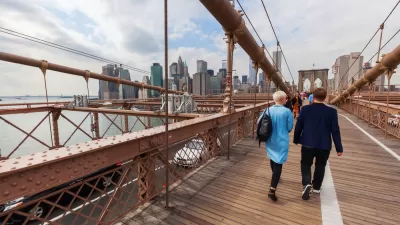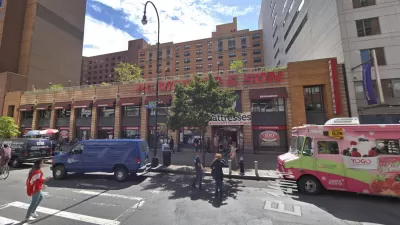The eagerly anticipated addition of a $2 billion campus for Cornell on Roosevelt Island will include a gesture toward the new model of innovation economy that directly connects universities with their cities.
Jessica Leber reports on a critical component of Cornell's new $2 billion campus on Roosevelt Island in New York City—a "corporate co-location" building that will make a literal connection between academia and corporate interests. The Bridge, as the building is called, is one of three buildings scheduled to open in 2017 as part of the project's first phase.
Leber got the scoop on the name of the building prior to a groundbreaking ceremony held on June 16, and a promo video is also available online that teases the concept.
Leber explains a little more about what makes the building unique in the crowded New York City commercial real estate market:
"The Bridge is unusual for New York office space in that it doesn't have pre-leased anchor tenants other than Cornell Tech. The companies in the building will be carefully curated by Forest City Ratner, in discussions with the university. The goal is to bring in an eclectic mix of startups (ideally involving the school's graduates) and larger companies working on applications that match Cornell’s program areas: connective media, the built environment, and health tech."
The article also includes renderings of the new building and some description of design details by Leber.
FULL STORY: Introducing The Bridge, The Innovation Hub Of New York City's $2 Billion Tech Campus

Planetizen Federal Action Tracker
A weekly monitor of how Trump’s orders and actions are impacting planners and planning in America.

Restaurant Patios Were a Pandemic Win — Why Were They so Hard to Keep?
Social distancing requirements and changes in travel patterns prompted cities to pilot new uses for street and sidewalk space. Then it got complicated.

Map: Where Senate Republicans Want to Sell Your Public Lands
For public land advocates, the Senate Republicans’ proposal to sell millions of acres of public land in the West is “the biggest fight of their careers.”

Orange County, Florida Adopts Largest US “Sprawl Repair” Code
The ‘Orange Code’ seeks to rectify decades of sprawl-inducing, car-oriented development.

Maui's Vacation Rental Debate Turns Ugly
Verbal attacks, misinformation campaigns and fistfights plague a high-stakes debate to convert thousands of vacation rentals into long-term housing.

San Francisco Suspends Traffic Calming Amidst Record Deaths
Citing “a challenging fiscal landscape,” the city will cease the program on the heels of 42 traffic deaths, including 24 pedestrians.
Urban Design for Planners 1: Software Tools
This six-course series explores essential urban design concepts using open source software and equips planners with the tools they need to participate fully in the urban design process.
Planning for Universal Design
Learn the tools for implementing Universal Design in planning regulations.
Heyer Gruel & Associates PA
JM Goldson LLC
Custer County Colorado
City of Camden Redevelopment Agency
City of Astoria
Transportation Research & Education Center (TREC) at Portland State University
Camden Redevelopment Agency
City of Claremont
Municipality of Princeton (NJ)





























